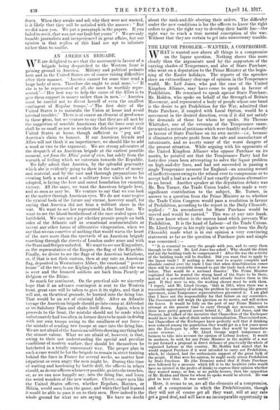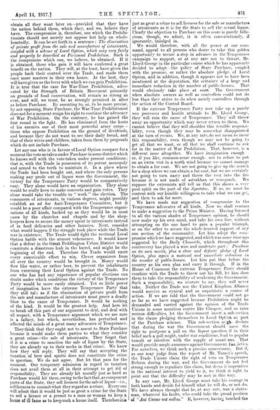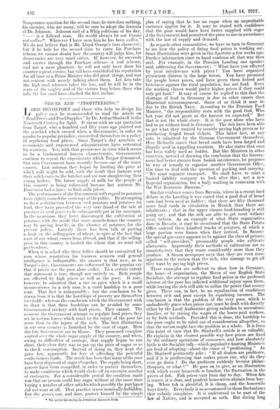THE LIQUOR PROBLEM.—WANTED, A COMPROMISE.
WHAT is wanted now above all things is a compromise on the liquor question. Nothing shows this more clearly than the arguments used by the supporters of the varying shades of Temperance, and also of State Purchase, who went on a deputation to the Prime Minister at the begin- ning of the Easter holidays. The reports of the speeches show an extraordinary cleavage of opinion in the Temperance world. Mr. Leif Jones, who put the case of the United Kingdom Alliance, may have come to speak in favour of Prohibition. He remained to speak against State Purchase. Mr. Holden, who spoke on behalf of the Strength of Britain Movement, and represented a body of people whose one bond is the desire to get Prohibition for the War, admitted that State Purchase, if coupled with Local Option, would be a movement in the desired direction, even if it did not satisfy the demands of those for whom he spoke. Sir Thomas Whittaker, one of the veterans of the Temperance cause, presented a series of petitions which were frankly and avowedly in favour of State Purchase on its own merits—i.e., because it eliminates private profit from .the sale and manufacture of intoxicants, and so averts many of the worst dangers of the present situation. While arguing with his opponents of the United Kingdom Alliance who oppose Purchase on its merits, he pointed out that the Temperance Party had for forty-five years been attempting to solve the liquor problem on high-and-dry lines, and had not succeeded in passing a single Temperance measure for England—an amazing record of ineffectiveness owing to the refusal ever to compromise or to accept half a loaf as a useful if not exactly glorious alternative to no bread. Another speaker at the deputation debate was Mr. i3en Turner, the Trade Union leader, who made a very significant contribution to the subject. Mr. Turner, in answer to a question from the Prime Minister as to whether the Trade Union Congress would pass a resolution in favour of Prohibition, according to the report in the Daily Chronicle, replied : " An amendment for State Purchase would be moved and would be carried." This was at any rate frank. We now know whose is the unseen hand which prevents War Prohibition. It is the hand of Labour—of the Trade Unions. Mr. Lloyd George in his reply (again we quote from the Daily Chronicle) made what is in our opinion a very convincing statement as far as the question of Purchase pure and simple was concerned :- " It is essential to carry the people with you, and to carry thorn through to the end. Mr. Leif Jones has asked : Why should the drink and not the building trade be compensated ? After the war the activity of the building trade will be doubled. Did you want that to apply to the liquor trade ? If nothing is done now to acquire complete and absolute control over the trade I fear that when demobilization comes there will be an irresistible demand to put the trade back where it was before. That would be a national disaster.' The Prime Minister explained that ho wanted the strong hand of the State to be there, instead of a powerful interest which had already beaten them in the past. If they were to win, the working classes must be with them. I regret,' said Mr. Lloyd George, that in 1913, when there was a reasonable opportunity of solving the problem by something like general agreement, some Temperance representatives prevented it. I am glad that I have not the responsibility for that failure on my conscience. The Government will weigh the question on its merits, and will reckon the forces. It would be folly on the part of any Prime Minister to attempt at the present time to carry through any measure, unless there were pretty general assent behind it.' Air. Leif Jones, said the Premier, had talked of the incentive that Chancellors of the Exchequer would have in the sale of drink under nationalization. That existednow, but Chancellors of the Exchequer knew perfectly well that if drinking were reduced among the population they would get in a few years more into the Exchequer by other means than they would by immediate excise revenue. . . . Mr. Lloyd George urged temperance re- formers to take into account the opinion of Labour leaders. It would be madness, he said, for any Prime Minister in the middle of a war to put forward a proposal in direct defiance of practically the whole of organized Labour in this country. Mr. Holden had stated that he would support Purchase if it were intended to carry out Prohibition, which, ho claimed, had the enthusiastic support of the great bulk of the people. If that were his opinion, he might easily attain Prohibition by State Purchase. He (the Premier) noted that if State Purchase were followed by a measure which left it to the localities (who would have no interest in the profits of drink) to express their opinion whether they wanted many, or few, or no public-houses, then the opposition of Mr. Holden and those for whom he spoke would be altered. He was glad to hear that. It was useful."
Here, it seems to us, are all the elements of a compromise, and of a compromise in which the Piohibitionists, though they will not of course get all they want, will at any rate get a good deal, and will have an incomparable opportunity to by not opposing, State Purchase, the War-Time Prohibitionist If the extreme Temperance Party now take up a purely does not for a moment resign his right to continue the advocacy non possumus and hostile attitude to Mr. Lloyd George, of War Prohibition. On the contrary, he has gained the they will ruin the cause of Temperance. They will throw first round in the fight. He has eliminated from the hosts away an opportunity which may never return to them. We of his enemies one of their most powerful army corps— cannot believe that they will shoulder this terrible responsi- those who oppose Prohibition on the ground of dividends, bility, even though they may be somewhat disappointed and because they do not want to see their daily bread, and at the turn of events. We, at any rate, do not mean to incur that of their wives and children, taken from them by proposals this responsibility, even though we inav not be going to which do not include Purchase. get all that we want, or all that we sh.all continue to ask Let any one who is in favour of Local Option compare. fora for in the matter of War Prohibition. That, however, is a moment the vote as taken under -Purchase in some district which different issue altogether. We have imagine( ion enough he knows well with the vote taken under present conditions ; or, if you like, common-sense enough— not to refuse to put that is, with the Trade in possession of its potent monopoly on an extra vest in a north wind because we cannot manage and armed to the teeth .to maintain it. In a place where to obtain a fur coat. We arc not going to give up the search the Trade had been bought out, and where the only persons for a shop where we can obtain a fur coat, but we are certainly making any -profit out of liquor were the Government, the not going to turn nasty and throw the vest into the fire victory for the Temperance Party would, be comparatively because it is not made of astrakhan or musquash. We easy. They alone- would have an organization. They alone suppose the extremists will tell us that this shows a very would be really-keen to make converts and-gain votes. ' They poor spirit on the part of the Spectator. if so, we must be alone would take the-trouble to " work " the election. The content with our humble willingness to take what we can get, consumers of intoxicants, in various degrees, might possibly and then to ask for more. establish an ad hoe Anti-Temperance Committee, but it We have made our suggestion of compromise to the would be a poor affair compared with the Temperance organi- Temperance advocates of all kinds. Now we shall venture zations of all kinds, backed up as they would be in most to make a suggestion to the Prime Minister. Having listened cases by the churches and chapels and by the shop- to all the various shades of Temperance opinion, he should keepers keen to secure the money spent in intoxicants instead now make up his own mind, and take his own line, without of in food delicacies and other luxuries. Next, consider attempting on the one hand to gain a popular triumph, what would happen if the struggle took place while the Trade or on the other to secure the whole-hearted support. of any was in existence. The Trade would fight the sectional Local one section of the community. Let him adopt the coin- Option battle with the utmost vehemence. It would know promise which we have suggested, and which was some time ago that a defeat in the Great Peddling,ton Urban District would suggested by the Daily Chronicle, which throughout I his constitute a disastrous leak in the barrel, and might be the controversy has played a wise and moderate part: Purchase beginning of the end. Therefore the Trade would exert on its own merits, plus a clear and definite pledge rf Local every conceivable effort to win. Clever organizers from Option, plus again a material and immediate reduction in all over the country would be brought in. Money would the number of public-houses. Let him put that before the flow like water, or rather beer, to prevent the inhabitants country as his own plan and carry it through. If in the from exercising their Local Option against the Trade. No House of Commons the extreme Temperance Party should one who has had any experience of popular elections can combine with the Trade to throw out his Bill, let him dare doubt under which conditions the victory of the Temperance them to take the responsibility of weakening the Government. Party would be more easily obtained. Yet so little power Such a responsibility, wo venture to say, they will never of imagination have the extreme Temperance Party that take. Neither the Trade nOr the United kingdom Alliance they still tat r. as if the elimination of private profit from would survive so cynical and so unpatriotic a course of the sale and manufacture of intoxicants must prove a deadly action. If we are told that the Government could not go blow to the cause of Temperance. It would- be nothing so far as we have suggested because Prohibition might be of the kind. It would be the greatest help. And here let demanded and carried against the opinion of the Trade us break off this part of our argument to deal, and deal with Unions in some munition centre like Glasgow, and so raise all respect, with a Temperance argument which we are surd serious difficulties, let the Co vernment insert a sub-section is a fallacy, but which, nevertheless, has perturbed and in the clause pledging themselves to Local Option as part affected the minds of a great many advocates of Temperance. of the Purchase scheme. This sub-section nigh ; declare They think that they ought not to assent to State Purchase that during the war the Government should have the because it would make them parties to what they consider right to postpone a poll on . the liquor question if in their a great crime—Lthe sale of intoxicants. They forget that belief such a poll might, under war conditions, lead to popular if it is a crime to sanction the sale of liquor by the State, tumult or interfere with the supply of munit'ons. That they are already up to their necks in that crime. We know would provide ample assurance against Government. pan defies. how they will reply. They will say that accepting the For ourselves, we think such a proviso unnecessary. But if, taxation of beer and spirits does not constitute the crime as one may judge from the report of Mr. Turner's speech, in question. We do not agree. But let that pass for the the Trade Unions claim the right of veto on Temperance moment. Our temporary admission in regard to taxation Reform during the war, and the Government do not feel does not avail them at all in their attempt to get rid of strong enough to repudiate this claim, but deem it imperative responsibility. They arc already hit morally just as hard as in the national interest to yield to it, we think it right to Purchase would hit them, owing to the fact that, as component Point out that the difficulty may be met in this way. parts of the State, they sell licences for the sale of liquor—i.e., In any case, Mr. Lloyd George must take his courage in seltlicences to commit what they regard as a crime. Everyone both hands and decide for himself what he will do, or not do. will admit that it would be just as great a crime for the State We have always thought that he, at any rate, was a states- to sell a licence or a permit to a man or woman to keep a man, whatever his faults, who could take the proud position house of ill fame as to keep such a house itself. Therefore itis of "Jut Caesar aut nullus." lf, however, having touched the obtain all they want later on—provided that they have just as great a crime to sell licences for the sale or manufacture the nation behind them, which they, and we, believe they of intoxicants as it is for the State to sell the actual liquor. have. The compromise is, therefore, one which the Prohibi- Clearly the objection to Purchase on this score is purely fella- tionists should not -merely not oppose but help on whole- cious, though, wo admit, it is often conscientiously, if heartedly. It can be set forth in a sentence : The elimination ignorantly, indulged in. of private profit from the sale and manufacture of intoxicants, We would therefore, with all the power at our com- coupled with a scheme of Local Option, which may very fairly mand, appeal to all persons who desire to take this golden and properly be described as Piecemeal Prohibition. Such is opportunity to secure a step in advance in the Temperance the compromise which can, we believe, be obtained. If it campaign to support, or at any rate not to thwart, Mr. is obtained, those who gain it will have conferred a great Lloyd George in the particular course which he has apparently benefit on the nation. They.will, at the least, have given the decided to adopt—the policy of State Purchase, coupled people back their control over the Trade, and made them with the promise, or rather the absolute pledge, of Local once more masters in their own house. At the best, they Option, and in addition, though it appears not to have been will have given us the lever with which we can gain Prohibition. mentioned at the deputation, the certainty of a large and It is true that the case for War-Time Prohibition, advo- immediate reduction in the number of public-houses. That cated by the Strength of Britain Movement primarily would obviously take place at once. The Government on grounds of food conservation, will remain as strong as when absolute • owners as well as controllers could not do ever, and will, we trust, be as strongly persisted in after less than they strive to do when merely controllers through as before Purchase. By assenting to, or, to be more precise, the action of the Control Board. Temperance question for the second time, he now does nothing, his enemies, who are many, will be sure to adopt the formula of Dr. Johnson. Johnson said of a Whig politician of his day, is a Liberal man. He would always be aut Caesar aut nullus.* Wherever I have seen him he has been nullus." We do not believe that is Mr. Lloyd George's true character ; but if he fails for the second time to carry his Purchase scheme we cannot doubt how the country will judge him, for democracies are very cruel critics. If, however, he succeeds and carries through the Purchase scheme—a real scheme, and not a mere phantom—he will not only have done his country a great service, but will have established his reputation for all time as a Prime Minister who did great things, and was not content with merely talking about them. It him take the high road whoever takes the low, and he will be in the seats of the mighty and of the victors long before those who take the low road have climbed the first incline.




























 Previous page
Previous page